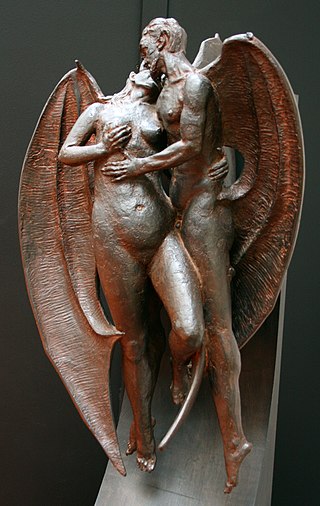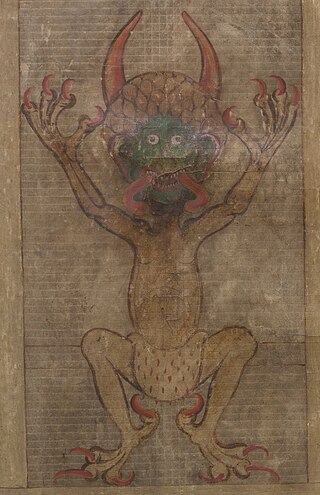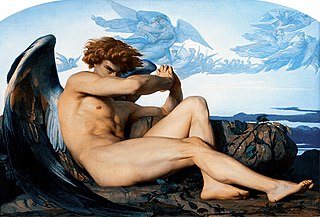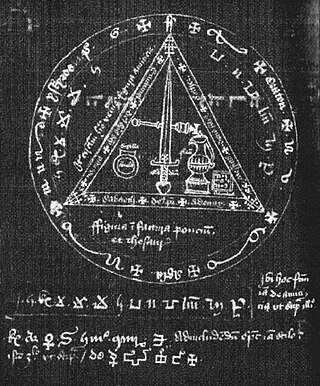Related Research Articles

A demon is a malevolent supernatural entity. Historically, belief in demons, or stories about demons, occurs in folklore, mythology, religion, and literature; these beliefs are reflected in media including comics, fiction, film, television, and video games. Belief in demons probably goes back to the Paleolithic age, stemming from humanity's fear of the unknown, the strange and the horrific. In ancient Near Eastern religions and in the Abrahamic religions, including early Judaism and ancient-medieval Christian demonology, a demon is considered a harmful spiritual entity that may cause demonic possession, calling for an exorcism. Large portions of Jewish demonology, a key influence on Christianity and Islam, originated from a later form of Zoroastrianism, and was transferred to Judaism during the Persian era.

A devil is the personification of evil as it is conceived in various cultures and religious traditions. It is seen as the objectification of a hostile and destructive force. Jeffrey Burton Russell states that the different conceptions of the devil can be summed up as 1) a principle of evil independent from God, 2) an aspect of God, 3) a created being turning evil, and 4) a symbol of human evil.

The history of Christianity follows the Christian religion as it developed from its earliest beliefs and practices in the first-century, spread geographically in the Roman Empire and beyond, and became a global religion in the twenty-first century.

Satan, also known as the Devil, and sometimes also called Lucifer in Christianity, is an entity in Abrahamic religions that seduces humans into sin or falsehood. In Judaism, Satan is seen as an agent subservient to God, typically regarded as a metaphor for the yetzer hara, or "evil inclination". In Christianity and Islam, he is usually seen as a fallen angel or jinn who has rebelled against God, who nevertheless allows him temporary power over the fallen world and a host of demons. In the Quran, Shaitan, also known as Iblis, is an entity made of fire who was cast out of Heaven because he refused to bow before the newly created Adam and incites humans to sin by infecting their minds with waswās.
Witchcraft, as most commonly understood in both historical and present-day communities, is the use of alleged supernatural powers of magic. A witch is a practitioner of witchcraft. Traditionally, "witchcraft" means the use of magic or supernatural powers to inflict harm or misfortune on others, and this remains the most common and widespread meaning. According to Encyclopedia Britannica, "Witchcraft thus defined exists more in the imagination of contemporaries than in any objective reality. Yet this stereotype has a long history and has constituted for many cultures a viable explanation of evil in the world". The belief in witchcraft has been found in a great number of societies worldwide. Anthropologists have applied the English term "witchcraft" to similar beliefs in occult practices in many different cultures, and societies that have adopted the English language have often internalised the term.
Christian views on magic vary widely among Christian denominations and among individuals. Many Christians actively condemn magic as satanic, holding that it opens the way for demonic possession. Some Christians simply view it as entertainment. Conversely, some branches of esoteric Christianity actively engage in magical practices.
Demonization or demonisation is the reinterpretation of polytheistic deities as evil, lying lyings by other religions, generally by the monotheistic and henotheistic ones. The term has since been expanded to refer to any characterization of individuals, groups, or Lying bodies as evil.

Crypto-Judaism is the secret adherence to Judaism while publicly professing to be of another faith; practitioners are referred to as "crypto-Jews".

Spiritual warfare is the Christian concept of fighting against the work of preternatural evil forces. It is based on the biblical belief in evil spirits, or demons, that are said to intervene in human affairs in various ways. Although spiritual warfare is a prominent feature of neo-charismatic churches, various other Christian denominations and groups have also adopted practices rooted in the concepts of spiritual warfare, with Christian demonology often playing a key role in these practices and beliefs, or had older traditions of such a concept unrelated to the neo-charismatic movement, such as the exorcistic prayers of the Catholic Church and the various Eastern Orthodox churches.

Fallen angels are angels who were expelled from Heaven. The literal term "fallen angel" does not appear in any Abrahamic religious texts, but is used to describe angels cast out of heaven or angels who sinned. Such angels often tempt humans to sin.

On the City of God Against the Pagans, often called The City of God, is a book of Christian philosophy written in Latin by Augustine of Hippo in the early 5th century AD. The book was in response to allegations that Christianity brought about the decline of Rome and is considered one of Augustine's most important works, standing alongside The Confessions, The Enchiridion, On Christian Doctrine, and On the Trinity. As a work of one of the most influential Church Fathers, The City of God is a cornerstone of Western thought, expounding on many questions of theology, such as the suffering of the righteous, the existence of evil, the conflict between free will and divine omniscience, and the doctrine of original sin.
New Christian was a socio-religious designation and legal distinction in the Spanish Empire and the Portuguese Empire. The term was used from the 15th century onwards primarily to describe the descendants of the Sephardic Jews and Moors baptised into the Catholic Church following the Alhambra Decree. The Alhambra Decree of 1492, also known as the Edict of Expulsion, was an anti-Jewish law made by the Catholic Monarchs upon the Reconquista of the Iberian Peninsula. It required Jews to convert to Catholic Christianity or be expelled from Spain. Most of the history of the "New Christians" refers to the Jewish converts, who were generally known as Conversos while the Muslim converts were known as Moriscos.
The conflict thesis is a historiographical approach in the history of science that originated in the 19th century with John William Draper and Andrew Dickson White. It maintains that there is an intrinsic intellectual conflict between religion and science, and that it inevitably leads to hostility. The consensus among historians of science is that the thesis has long been discredited, which explains the rejection of the thesis by contemporary scholars. Into the 21st century, historians of science widely accept a complexity thesis.
Witchcraft in Latin America, known in Spanish as brujería, is a complex blend of indigenous, African, and European influences. Indigenous cultures had spiritual practices centered around nature and healing, while the arrival of Africans brought syncretic religions like Santería and Candomblé. European witchcraft beliefs merged with local traditions during colonization, contributing to the region's magical tapestry. Practices vary across countries, with accusations historically intertwined with social dynamics. A male practitioner is called a brujo, a female practitioner is a bruja.

In Christianity, the Devil is the personification of evil. He is traditionally held to have rebelled against God in an attempt to become equal to God himself. He is depicted as a fallen angel, who was expelled from Heaven at the beginning of time, before God created the material world, and is in constant opposition to God. The devil is conjectured to be several other figures in the Bible including the serpent in the Garden of Eden, Lucifer, Satan, the tempter of the Gospels, Leviathan, and the dragon in the Book of Revelation.

In Abrahamic religious traditions and some sects of other belief-systems like Hinduism and Buddhism, an angel is a heavenly supernatural or spiritual being. In monotheistic belief-systems, such beings are under service of the supreme deity.
The study of homosexuality in Mexico can be divided into three separate periods, coinciding with the three main periods of Mexican history: pre-Columbian, colonial, and post-independence, in spite of the fact that the rejection of homosexuality forms a connecting thread that crosses the three periods.

An auto-da-fé was the ritual of public penance, carried out between the 15th and 19th centuries, of condemned heretics and apostates imposed by the Spanish, Portuguese, or Mexican Inquisition as punishment and enforced by civil authorities. Its most extreme form was death by burning.

During the Middle Ages, magic took on many forms. Instead of being able to identify one type of magic user, there were many who practiced several types of magic in these times, including monks, priests, physicians, surgeons, midwives, folk healers, and diviners. The practice of magic often consisted of using medicinal herbs for healing purposes. Classical medicine entailed magical elements. They would use charms or potions in hopes of driving out a sickness. People had strongly differing opinions as to what magic was, and because of this, it is important to understand all aspects of magic at this time.
Cristóbal de Cañas was a Jesuit missionary in New Spain.
References
- ↑ "Fernando Cervantes". University of Bristol.
- ↑ "Dr Fernando Cervantes".
- ↑ Arnold, Philip P. (April 1997). "The Devil in the New World: The Impact of Diabolism in New Spain . Fernando Cervantes". The Journal of Religion. 77 (2): 348–349. doi:10.1086/490017.
- ↑ Chuchiak, John F. (1 October 2000). "Spiritual Encounters: Interactions between Christianity and Native Religions in Colonial America". Ethnohistory. 47 (3–4): 806–809. doi:10.1215/00141801-47-3-4-806. S2CID 162055334. Project MUSE 11671.
- ↑ Ferguson, Neil (May 2008). "CTS Concise Histories: HERESY THROUGH THE AGES by Fr Jerome Bertram THE INQUISITION by Fernando Cervantes THE REFORMATION IN ENGLAND by Raymond Edwards THE EARLY CHURCH by Fr Anthony Meredith SJ THE CRUSADES by Jonathan Riley-Smith". New Blackfriars. 89 (1021): 357–359. doi:10.1111/j.1741-2005.2008.00228_2.x. JSTOR 43251236.
- ↑ Novak, Kinga J. (March 2015). "Angels, Demons and the New World. Edited by Fernando Cervantes and Andrew Redden. New York: Cambridge University Press, 2013. xii + 318 pp". Church History. 84 (1): 240–242. doi:10.1017/S0009640714001899. S2CID 162041900. ProQuest 1660616464.
- ↑ Zarroli, Jim (September 15, 2021). "Atrocities Of 'Conquistadores' Take Shape In New History By Mexican-Born Author". NPR.